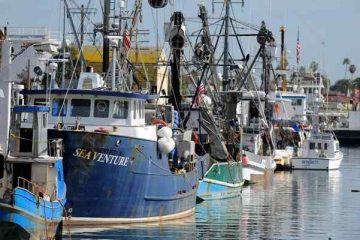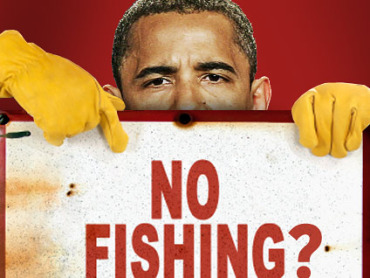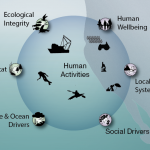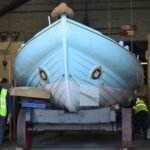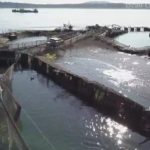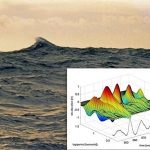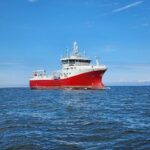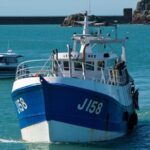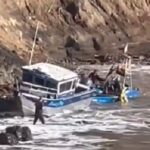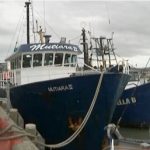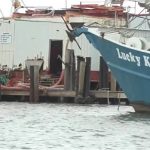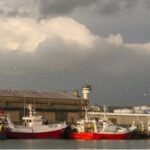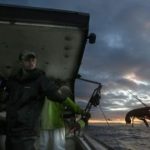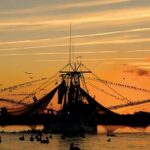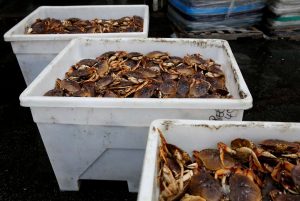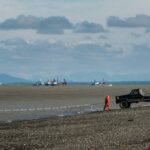Tag Archives: environmental groups
D.B. Pleschner: Nearshore anchovy abundance not proof fishery is collapsing
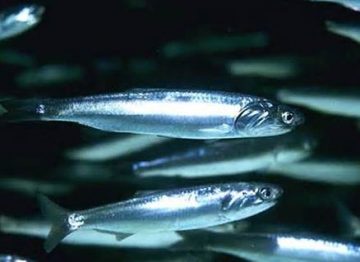 Recently, Dr. William Sydeman of the Farallon Institute, published a study claiming that the abundance of anchovy near shore — especially in places like Monterey — is evidence that the population is collapsing. Sydeman’s logic is based on an old argument that collapsed populations always shrink inshore. But there’s one big problem with that theory — it’s unsupported by scientific evidence.,,, The bottom line: environmental groups with an anti-fishing agenda are already gearing up to hot-box the Pacific Fishery Management Council in spring 2018, lobbying for a steep reduction in anchovy harvest limits, employing whatever colorful, sensational pictures they can paint. click here to read the story 20:58
Recently, Dr. William Sydeman of the Farallon Institute, published a study claiming that the abundance of anchovy near shore — especially in places like Monterey — is evidence that the population is collapsing. Sydeman’s logic is based on an old argument that collapsed populations always shrink inshore. But there’s one big problem with that theory — it’s unsupported by scientific evidence.,,, The bottom line: environmental groups with an anti-fishing agenda are already gearing up to hot-box the Pacific Fishery Management Council in spring 2018, lobbying for a steep reduction in anchovy harvest limits, employing whatever colorful, sensational pictures they can paint. click here to read the story 20:58
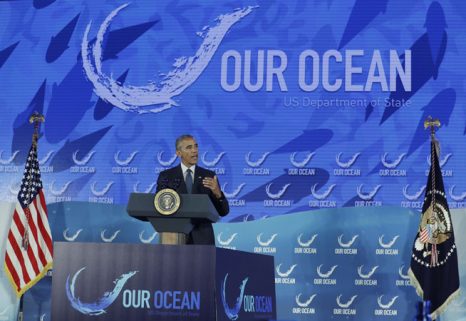
Trump team wants State Dept. to disclose how much of your money it sends to international environmental groups
Donald Trump’s presidential transition team has asked State Department officials to disclose how much money it provides each year to international environmental groups. It’s the latest example of how the incoming administration is reassessing the U.S. government’s approach to tackling climate change and other environmental priorities. As part of a list of questions posed last week to the department’s Bureau of Oceans and International Environmental and Scientific Affairs, according to multiple people familiar with the matter, the Trump landing team asked, “How much does the Department of State contribute annually to international environmental organizations in which the department participates?” Although some State Department officials found the question about funding for environmental groups troubling, one senior official, speaking on the condition of anonymity because transition communications are confidential, said the requests from the transition team have been appropriate. “They are legitimately looking at the organization of things here at Foggy Bottom,,, Read the rest here 16:16
Fishermen upset over extension of ban
 With only six months remaining in a two-year ban on all fishing activities in the vicinity of the port town of San Felipe, Baja California, there is now disagreement between fishermen and environmental groups over what happens next. Fishing techniques had become a threat to the vaquita, whose numbers have declined to an estimated 60, because they are caught along with the totoaba, a fish species whose swim bladder is a delicacy in China. The two-year federal program was intended to give the marine mammals a respite started in April 2015. As its end draws near, environmental organizations have asked authorities for broader controls on the illegal totoaba fishing and the creation of a safe zone for the vaquita. Read the story here 14:59
With only six months remaining in a two-year ban on all fishing activities in the vicinity of the port town of San Felipe, Baja California, there is now disagreement between fishermen and environmental groups over what happens next. Fishing techniques had become a threat to the vaquita, whose numbers have declined to an estimated 60, because they are caught along with the totoaba, a fish species whose swim bladder is a delicacy in China. The two-year federal program was intended to give the marine mammals a respite started in April 2015. As its end draws near, environmental organizations have asked authorities for broader controls on the illegal totoaba fishing and the creation of a safe zone for the vaquita. Read the story here 14:59
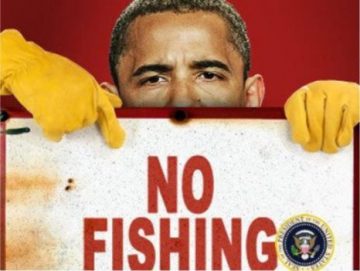
Well, he did it, but we knew he would. Obama just destroyed more fishermen and supporting businesses
President Obama will designate a section of the Atlantic Ocean off Cape Cod on Thursday as a national monument, banning commercial fishing in the area by 2023 in an effort to protect the region’s ecosystem. The move, which the president will formally announce at the Third Annual Our Ocean Conference in Washington, won praise Wednesday from environmental groups but drew condemnation from the fishing industry. White House officials emphasized the reduced size of the area of the national monument as a balance between between conservation and creating a “sustainable environment for the fishing industry going forward.” Read the story here, and here . more will be added. 07:45
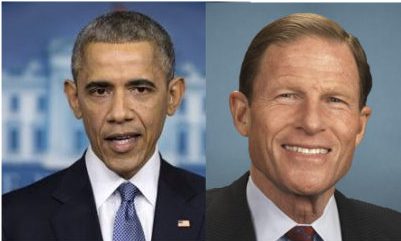
Will Obama fence off more of the ocean? US fishermen are fearful
American fishermen are deeply fearful that the Obama White House could cut them off as early as this week from major fishing areas of the U.S. continental shelf on both coasts, further restricting one of the most highly regulated fishing industries in the world. At stake are millions of dollars in fishing revenue and hundreds of jobs — and in some parts of the country, the survival of an embattled way of life that has persisted for centuries but is facing environmentalist pressures unlike anything before. “This totally affects us, but we don’t know what’s going on,” one fishing boat owner, who asked to remain anonymous, told Fox News. “We are just out of the loop. No one even wants to say what effect it will have.” “They are throwing all fishermen under the bus, along with their supporting industries”. Behind-the-scenes maneuvering to get influential Democratic legislators to support such new preservation areas publicly — a tough call, since the affected fishermen are also constituents. So far, many of the Democrats are keeping a low profile. One exception has been U.S. Sen. Richard Blumenthal of Connecticut. Blumenthal was backed by some 40 environmental groups — but not by many of his neighboring Democratic Senate colleagues. Read the story here 14:10
A Fish And Wildlife Seat Up For Grabs, With High Stakes
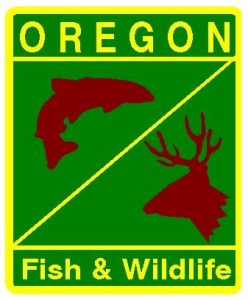 Openings on the Oregon Fish and Wildlife Commission have sport fishing groups eyeing an opportunity to gain a voice while some environmental groups worry they’ll lose one. Two members are up for reappointment and another seat is vacant on the commission, which sets natural resource policies ranging from hunting and fishing rules to last year’s decision to remove gray wolves from the endangered list. Recreational anglers hope one of their longtime advocates, Liz Hamilton, can become one of the seven members of the commission, which they say has tilted too far toward commercial fishing interests. Hamilton runs the Northwest Sportfishing Industry Association. She submitted a letter of interest to Oregon Gov. Kate Brown earlier this summer expressing her interest in joining the commission. It included endorsements from Sen. Ron Wyden and Reps. Earl Blumenauer and Kurt Schrader, along with several prominent figures from the sport fishing community. Environmental groups are supporting the reappointment of Greg Wolley, who they consider one of the commission’s strongest voice for conservation. He is also the first and only African-American member of the commission. Read the story here 10:14
Openings on the Oregon Fish and Wildlife Commission have sport fishing groups eyeing an opportunity to gain a voice while some environmental groups worry they’ll lose one. Two members are up for reappointment and another seat is vacant on the commission, which sets natural resource policies ranging from hunting and fishing rules to last year’s decision to remove gray wolves from the endangered list. Recreational anglers hope one of their longtime advocates, Liz Hamilton, can become one of the seven members of the commission, which they say has tilted too far toward commercial fishing interests. Hamilton runs the Northwest Sportfishing Industry Association. She submitted a letter of interest to Oregon Gov. Kate Brown earlier this summer expressing her interest in joining the commission. It included endorsements from Sen. Ron Wyden and Reps. Earl Blumenauer and Kurt Schrader, along with several prominent figures from the sport fishing community. Environmental groups are supporting the reappointment of Greg Wolley, who they consider one of the commission’s strongest voice for conservation. He is also the first and only African-American member of the commission. Read the story here 10:14
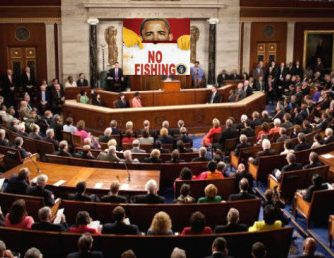
National Marine Monuments: N.E. Marine Preserve Proposal Ignites Debate Over Fishing
Proposals to create a vast national marine preserve off the New England coast are generating a whirlpool of debate that’s sucking in commercial fishermen, recreational anglers, environmentalists, multistate bureaucrats and politicians. Environmental groups are calling on President Obama to use his executive powers to establish a 6,180-square-mile New England Coral Canyons and Seamounts national monument. They insist it would protect a unique and ecologically critical marine environment lying about 150 miles off New England’s shores. If Obama heeds those calls, virtually all fishing and commercial operations such as oil and undersea mining would be banned within the new national preserve. The controversy has exposed deep fault lines between commercial fishermen fiercely opposed to new federal restrictions on their industry and many recreational anglers who argue the preserve would benefit fishing in the region. Read the article here 18:03
California Marine Life Protection Act: The ultimate bait and switch
 There is no question that the passage of the Marine Life Protection Act (MLPA) has been the most controversial environmental issue California’s angling community has ever faced. It signaled the state’s shift from a shared philosophy of conserving California’s natural resources to outright protectionism, with little regard to the interests of outdoor recreation, tourism and all of their economic benefits. As the MLPA established the framework for Marine Protected Areas (MPAs), the state promised California anglers that areas designated as off-limits to commercial and recreational fishing may one day be open to fishing. In fact, they were very specific in their promises. Scientific assessments would be conducted every five years, and as fish populations were assessed as sustainably viable, the restrictions would be lifted. (But would they be?) Read the rest here 16:56
There is no question that the passage of the Marine Life Protection Act (MLPA) has been the most controversial environmental issue California’s angling community has ever faced. It signaled the state’s shift from a shared philosophy of conserving California’s natural resources to outright protectionism, with little regard to the interests of outdoor recreation, tourism and all of their economic benefits. As the MLPA established the framework for Marine Protected Areas (MPAs), the state promised California anglers that areas designated as off-limits to commercial and recreational fishing may one day be open to fishing. In fact, they were very specific in their promises. Scientific assessments would be conducted every five years, and as fish populations were assessed as sustainably viable, the restrictions would be lifted. (But would they be?) Read the rest here 16:56
Enviro’s spar with Obama administration over fish catches!
 A proposed federal rule that would give regional councils more say in setting catch limits on fish has sparked rare friction between the Obama administration and environmental groups. The proposal, years in the making, could take effect this summer. It would provide the eight councils “additional clarity and potential flexibility” to comply with the Magnuson-Stevens Fisheries Conservation and Management Act. Groups like the Natural Resources Defense Council and Earth Justice say the change could roll back nearly a decade of progress in rescuing once-overfished populations. Read the rest here 20:58
A proposed federal rule that would give regional councils more say in setting catch limits on fish has sparked rare friction between the Obama administration and environmental groups. The proposal, years in the making, could take effect this summer. It would provide the eight councils “additional clarity and potential flexibility” to comply with the Magnuson-Stevens Fisheries Conservation and Management Act. Groups like the Natural Resources Defense Council and Earth Justice say the change could roll back nearly a decade of progress in rescuing once-overfished populations. Read the rest here 20:58
Framework 55 slashes groundfish quotas, halves at-sea monitors, enviros pissed
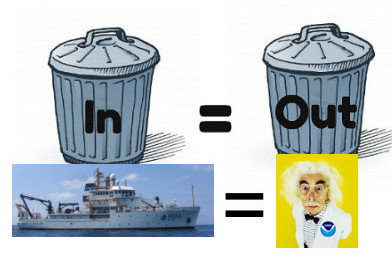 It seems the proposed rule, also known as Framework 55, has a little bit of something for everyone to hate. They have until close of business on April 5 to submit their comments to the National Oceanic and Atmospheric Administration. Environmental groups, such as Oceana, are bitterly criticizing the projected reduction in ASM for groundfish boats to about 14 percent from about 24 percent, saying the rule will “weaken the chances of recovery for this historic fishery.” Fishermen point to the further reductions in what they already consider minuscule catch quotas and say those reductions — combined with the absorption of the costs for ASM — could finally be the management initiative that shutters the Northeast multispecies groundfish fishery for good. Read the rest here 20:10
It seems the proposed rule, also known as Framework 55, has a little bit of something for everyone to hate. They have until close of business on April 5 to submit their comments to the National Oceanic and Atmospheric Administration. Environmental groups, such as Oceana, are bitterly criticizing the projected reduction in ASM for groundfish boats to about 14 percent from about 24 percent, saying the rule will “weaken the chances of recovery for this historic fishery.” Fishermen point to the further reductions in what they already consider minuscule catch quotas and say those reductions — combined with the absorption of the costs for ASM — could finally be the management initiative that shutters the Northeast multispecies groundfish fishery for good. Read the rest here 20:10
Trudeau-Obama shared Arctic leadership model a hit with environmental groups
 Environmental organizations are celebrating the prioritization of the Arctic in the joint statement on climate change issued by Prime Minister Justin Trudeau and U.S. President Barack Obama. The statement released yesterday in conjunction with Trudeau’s visit to Washington included a commitment to implement the Paris Agreement and reduce methane emissions. A shared leadership model on action in the Arctic was one of the highlights in the document. “That is not just significant, it’s historic and unprecedented,” said Louie Porta, policy director of The Pew Charitable Trust’s Oceans North Canada. Read the rest here 09:55
Environmental organizations are celebrating the prioritization of the Arctic in the joint statement on climate change issued by Prime Minister Justin Trudeau and U.S. President Barack Obama. The statement released yesterday in conjunction with Trudeau’s visit to Washington included a commitment to implement the Paris Agreement and reduce methane emissions. A shared leadership model on action in the Arctic was one of the highlights in the document. “That is not just significant, it’s historic and unprecedented,” said Louie Porta, policy director of The Pew Charitable Trust’s Oceans North Canada. Read the rest here 09:55
Environmentalists, Fishermen At Odds Over Turning Cashes Ledge Into National Monument
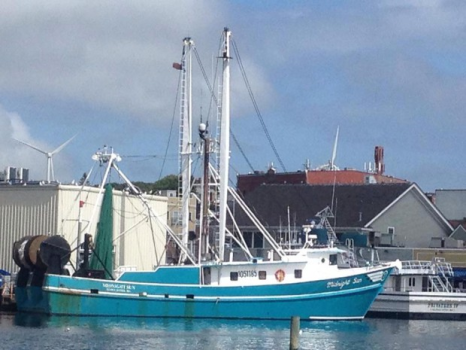 As some New England fishermen struggle under intense quota cuts, the industry is fearing another political move that could prove to have devastating consequences. There is an effort to designate Cashes Ledge — a historically important fishing area — as a national marine monument. This would require a presidential order and would effectively close the area to all commercial activity. About 80 miles off the coast of Cape Ann, a cold-water kelp forest grows from the tip of a ridge that rises from the ocean floor known as Cashes Ledge. Audio, Read the rest here 17:12
As some New England fishermen struggle under intense quota cuts, the industry is fearing another political move that could prove to have devastating consequences. There is an effort to designate Cashes Ledge — a historically important fishing area — as a national marine monument. This would require a presidential order and would effectively close the area to all commercial activity. About 80 miles off the coast of Cape Ann, a cold-water kelp forest grows from the tip of a ridge that rises from the ocean floor known as Cashes Ledge. Audio, Read the rest here 17:12
Jersey Shore Rally Urges Obama Admin to #KillTheDrill, #ProtectOurAtlantic
 U.S. Senators Bob Menendez and Cory Booker, and Congressman Frank Pallone (N.J.-06) today were joined by over 100 local leaders, environmental and tourism groups, Jersey Shore business owners and residents at a rally on the Asbury Park boardwalk to demand action to guard the Atlantic against offshore oil and gas exploration. The Obama Administration is currently planning to allow oil production off the coast of Virginia, the Carolinas and Georgia, putting New Jersey’s economy and shore communities at significant risk of a catastrophic oil spill. The federal Bureau of Ocean Energy Management (BOEM) is expected to release its revised plan in the coming weeks. Read the rest here 08:07
U.S. Senators Bob Menendez and Cory Booker, and Congressman Frank Pallone (N.J.-06) today were joined by over 100 local leaders, environmental and tourism groups, Jersey Shore business owners and residents at a rally on the Asbury Park boardwalk to demand action to guard the Atlantic against offshore oil and gas exploration. The Obama Administration is currently planning to allow oil production off the coast of Virginia, the Carolinas and Georgia, putting New Jersey’s economy and shore communities at significant risk of a catastrophic oil spill. The federal Bureau of Ocean Energy Management (BOEM) is expected to release its revised plan in the coming weeks. Read the rest here 08:07
Transparency? Christian Putnum SLAMS The Obama Administration, Enviro Groups, and NOAA collusion
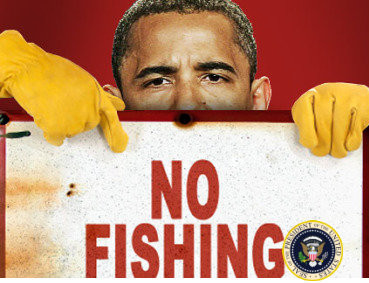 The National Oceanic and Atmospheric Administration and the Obama Administration are working closely with several environmental groups to “protect” vast areas of ocean off New England’s coast from the dreaded commercial and recreational fishermen. After NOAA’s utter failure to work with the stakeholders that make up the fishing community through the National Marine Fisheries Service, rebranded NOAA Fisheries after the name became synonymous with disastrous over-regulation, it appears an even less transparent process is now underway to regulate our natural resources. Read the article here 07:55
The National Oceanic and Atmospheric Administration and the Obama Administration are working closely with several environmental groups to “protect” vast areas of ocean off New England’s coast from the dreaded commercial and recreational fishermen. After NOAA’s utter failure to work with the stakeholders that make up the fishing community through the National Marine Fisheries Service, rebranded NOAA Fisheries after the name became synonymous with disastrous over-regulation, it appears an even less transparent process is now underway to regulate our natural resources. Read the article here 07:55
Fishermen say communities will ‘die’ if new regulations come into force
 Fishermen have warned their industry could be ruined and communities will die if planned regulation goes ahead. The Clyde Fishermen’s Association has said the viability of fishing in the firth would be undermined by changes to regulations governing marine protected areas (MPA), leading to economic collapse in the towns and villages dominated by fishing. The change to the regulations means fishing vessels could be restricted from certain areas, including south of Arran and the Sound of Jura, for environmental reasons. Read the article here 08:40
Fishermen have warned their industry could be ruined and communities will die if planned regulation goes ahead. The Clyde Fishermen’s Association has said the viability of fishing in the firth would be undermined by changes to regulations governing marine protected areas (MPA), leading to economic collapse in the towns and villages dominated by fishing. The change to the regulations means fishing vessels could be restricted from certain areas, including south of Arran and the Sound of Jura, for environmental reasons. Read the article here 08:40
FDA approval of AquaBounty GMO salmon decried by environmental and consumer groups
 Environmental and consumer groups in the United States and Canada are denouncing a decision by the U.S. Food and Drug Administration approving genetically modified salmon as food. The eggs for the salmon, which grow at twice the rate of regular salmon, are raised in a facility in the eastern Prince Edward Island community of Bay Fortune and exported to Panama, where they’re grown in above-ground tanks. Sharon Labchuk of the group said P.E.I. has been thrust into a negative spotlight with the FDA’s decision. Read the article here 13:18
Environmental and consumer groups in the United States and Canada are denouncing a decision by the U.S. Food and Drug Administration approving genetically modified salmon as food. The eggs for the salmon, which grow at twice the rate of regular salmon, are raised in a facility in the eastern Prince Edward Island community of Bay Fortune and exported to Panama, where they’re grown in above-ground tanks. Sharon Labchuk of the group said P.E.I. has been thrust into a negative spotlight with the FDA’s decision. Read the article here 13:18
ENGO’s with big money influence decision making on fisheries
 There were repeated statements made at last week’s meeting of the Western Pacific Fishery Management Council that the US Government regulations are hurting the whole fishing industry, from boat owners to fishermen to canneries and the communities they operate in. Hawaii Council member Michael Goto said, “When international regulations cause a fishery to close, I don’t see how we can convince other nations to abide by our standards. Goto told KHJ News that many of the regulations hurting fisheries are the result of lobbying by non government and environmental groups. Audio, Read the rest here 15:25
There were repeated statements made at last week’s meeting of the Western Pacific Fishery Management Council that the US Government regulations are hurting the whole fishing industry, from boat owners to fishermen to canneries and the communities they operate in. Hawaii Council member Michael Goto said, “When international regulations cause a fishery to close, I don’t see how we can convince other nations to abide by our standards. Goto told KHJ News that many of the regulations hurting fisheries are the result of lobbying by non government and environmental groups. Audio, Read the rest here 15:25
Net Effect: A different tack, and Campbell: Fishing regulations
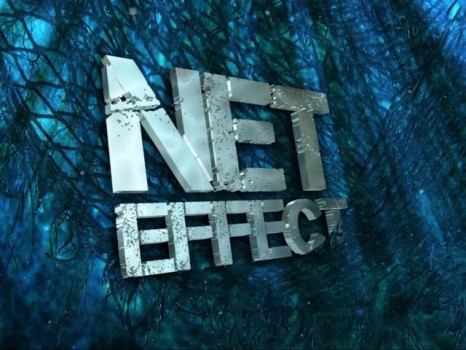 Our new WRAL documentary takes a different tack. It’s the result of a growing chorus of recreational fishermen, associated organizations and environmental groups that have raised legitimate concerns about certain commercial fishing practices. They practically beat down our door, giving us information, showing us data and offering up experts to interview. Their concerns are backed up by a number of state officials, including a scientist. Read the rest here – Campbell: Fishing regulations: After publishing my column about this topic in September, a coastal newspaper that had long printed my offerings immediately said they would no longer publish me. Read the rest here 09:49
Our new WRAL documentary takes a different tack. It’s the result of a growing chorus of recreational fishermen, associated organizations and environmental groups that have raised legitimate concerns about certain commercial fishing practices. They practically beat down our door, giving us information, showing us data and offering up experts to interview. Their concerns are backed up by a number of state officials, including a scientist. Read the rest here – Campbell: Fishing regulations: After publishing my column about this topic in September, a coastal newspaper that had long printed my offerings immediately said they would no longer publish me. Read the rest here 09:49 Fishermen in the Northeast win a small victory
 According to Climate Wire, an online publication of Environment and Energy Publishing LLC, New Bedford native son Bob Vanasse uncovered, through the use of Freedom of Information Act requests on behalf of Saving Seafood in Washington, D.C., a cluster of emails being circulated among several environmental groups hoping the president would be convinced to announce the New England monuments in Chile. The emails urged recipients to keep the plan a secret. “I hope no one is talking about Chile to the outside world,” an email from Conservation Law Foundation Interim President Peter Shelley said. Read the rest here 09:49
According to Climate Wire, an online publication of Environment and Energy Publishing LLC, New Bedford native son Bob Vanasse uncovered, through the use of Freedom of Information Act requests on behalf of Saving Seafood in Washington, D.C., a cluster of emails being circulated among several environmental groups hoping the president would be convinced to announce the New England monuments in Chile. The emails urged recipients to keep the plan a secret. “I hope no one is talking about Chile to the outside world,” an email from Conservation Law Foundation Interim President Peter Shelley said. Read the rest here 09:49
Environmental groups’ misguided spending on oceans
 Carlos Rafael famously and accurately predicted about five years ago that using the quota system known as catch shares in the Northeast Multispecies Fishery would drive small boats out of the water and consolidate licenses into the hands of a few. His operation would be fine, he said, because of its size. Now that government regulators have determined that fishermen will bear the cost of at-sea monitors, the pescatarian prognosticator has made another prediction. In a letter to the editor last week, the Oracle of the Ocean pointed out that analysis by the regulators,,, Read the rest here 08:37
Carlos Rafael famously and accurately predicted about five years ago that using the quota system known as catch shares in the Northeast Multispecies Fishery would drive small boats out of the water and consolidate licenses into the hands of a few. His operation would be fine, he said, because of its size. Now that government regulators have determined that fishermen will bear the cost of at-sea monitors, the pescatarian prognosticator has made another prediction. In a letter to the editor last week, the Oracle of the Ocean pointed out that analysis by the regulators,,, Read the rest here 08:37
Analysis: New England Marine Monument Proposals Overlook Existing Protections, Overstep Democratic Management
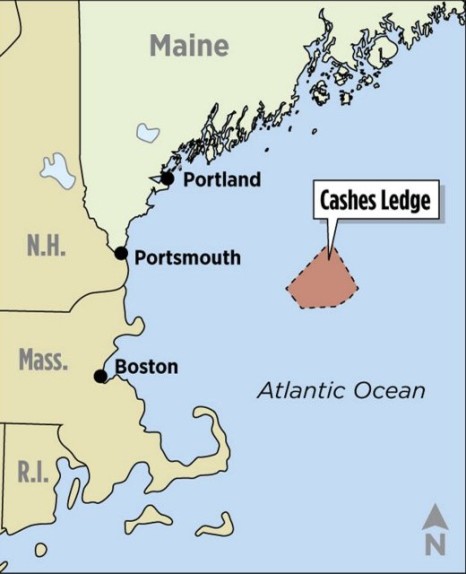 Fishermen, fisheries managers, and environmentalists agree that the Cashes Ledge region of the Gulf of Maine is home to some of the most important marine environments in New England. Since the early 2000s, federal fisheries managers have recognized the value of these areas and have taken proactive steps to protect their unique habitats, preventing commercial fishermen from entering the areas and allowing them to develop mostly undisturbed from human activity. But according to several environmental groups, including the Conservation Law Foundation, Pew Charitable Trusts, the National Geographic Society, and the Natural Resources Defense Council, such long-standing and effective protections are suddenly insufficient. Read the rest here 09:17
Fishermen, fisheries managers, and environmentalists agree that the Cashes Ledge region of the Gulf of Maine is home to some of the most important marine environments in New England. Since the early 2000s, federal fisheries managers have recognized the value of these areas and have taken proactive steps to protect their unique habitats, preventing commercial fishermen from entering the areas and allowing them to develop mostly undisturbed from human activity. But according to several environmental groups, including the Conservation Law Foundation, Pew Charitable Trusts, the National Geographic Society, and the Natural Resources Defense Council, such long-standing and effective protections are suddenly insufficient. Read the rest here 09:17
Environmental groups criticize reconfiguration of Georges Bank closed area’s
 Environmental groups quickly criticized the move as jeopardizing the health of the ocean in favor of economic interests, while advocates for fishermen said the changes will allow for better management of resources. Peter Shelley, interim president of the Conservation Law Foundation, said the reconfiguration diminishes protected habitat when New England’s cod stock is in historically bad shape.“Instead of exercising conservation stewardship, the council wrote off the future of critical fish habitat areas that needed additional, not fewer, protections,” Read the rest here 09:38
Environmental groups quickly criticized the move as jeopardizing the health of the ocean in favor of economic interests, while advocates for fishermen said the changes will allow for better management of resources. Peter Shelley, interim president of the Conservation Law Foundation, said the reconfiguration diminishes protected habitat when New England’s cod stock is in historically bad shape.“Instead of exercising conservation stewardship, the council wrote off the future of critical fish habitat areas that needed additional, not fewer, protections,” Read the rest here 09:38
West Coast sardine decline: Science vs. politics, By D.B. Pleschner
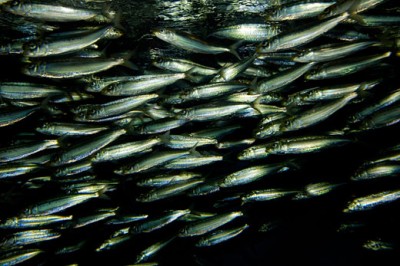 The federal Pacific Fishery Management Council has shut down the remainder of the current sardine season and has canceled the 2015-16 fishing season altogether. Fishermen supported this action. Why the closure? According to environmental groups like Oceana, it was to stop overfishing and save starving sea lions deprived of essential sardines. Neither reason is true, but many in the media have trumpeted this hyperbole put forth by groups whose political agenda is to shut down fishing completely. Read the rest here 08:40
The federal Pacific Fishery Management Council has shut down the remainder of the current sardine season and has canceled the 2015-16 fishing season altogether. Fishermen supported this action. Why the closure? According to environmental groups like Oceana, it was to stop overfishing and save starving sea lions deprived of essential sardines. Neither reason is true, but many in the media have trumpeted this hyperbole put forth by groups whose political agenda is to shut down fishing completely. Read the rest here 08:40
Whale Entanglements Up on the West Coast, Fishermen take the Lead!
 A record number of whales are becoming ensnared in fishing gear, including a killer whale that died last week north of Fort Bragg, according to federal data released Tuesday by environmental groups. “The fishermen really want to understand the reasons for these whale entanglements and gear interactions,” said Rachelle Fisher, administrator of California’s Dungeness Crab Task Force. “The fishermen I talk to say nobody wants to entangle whales.” Read the rest here 17:06
A record number of whales are becoming ensnared in fishing gear, including a killer whale that died last week north of Fort Bragg, according to federal data released Tuesday by environmental groups. “The fishermen really want to understand the reasons for these whale entanglements and gear interactions,” said Rachelle Fisher, administrator of California’s Dungeness Crab Task Force. “The fishermen I talk to say nobody wants to entangle whales.” Read the rest here 17:06
Another View: Sardine population isn’t crashing by D.B. Pleschner
 Environmental groups such as Oceana complain that the sardine population is collapsing just as it did in the mid-1940s. They blame “overfishing” as the reason and maintain that the fishery should be shut down completely (“Starving sea lions spotlight overfishing,” Viewpoints, April 14). In truth, Pacific sardines are perhaps the best-managed fishery in the world. The current rule – established in 2000 and updated last year with more accurate science – sets a strict harvest guideline. Read the rest here 10:25
Environmental groups such as Oceana complain that the sardine population is collapsing just as it did in the mid-1940s. They blame “overfishing” as the reason and maintain that the fishery should be shut down completely (“Starving sea lions spotlight overfishing,” Viewpoints, April 14). In truth, Pacific sardines are perhaps the best-managed fishery in the world. The current rule – established in 2000 and updated last year with more accurate science – sets a strict harvest guideline. Read the rest here 10:25
Deep sea fish quotas cut for two years in the Northeast Atlantic
 The EU Commission proposed today an overall cut in quotas for deep sea fishing in the northeast Atlantic for the next two years. However, environmental groups said it should have reduced some catch limits to zero to allow stocks to recover. Some are calling on the European Union to ban deep sea fishing altogether,,, Read the rest here 11:52
The EU Commission proposed today an overall cut in quotas for deep sea fishing in the northeast Atlantic for the next two years. However, environmental groups said it should have reduced some catch limits to zero to allow stocks to recover. Some are calling on the European Union to ban deep sea fishing altogether,,, Read the rest here 11:52
Oysters in the Chesapeake Bay: When Partnerships Work
Too often, environmental groups, regulators and fishermen find themselves cast in antagonistic roles on marine issues. Prolonged legal and regulatory battles frequently top headlines, while successful conservation partnerships go unheralded. The Chesapeake Bay, long plagued by problems like pollution and runoff, is benefitting from one such partnership. Read more here 11:10







